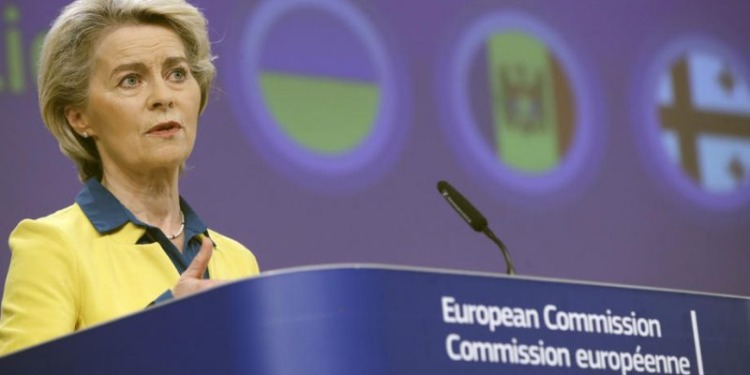The European Commission on Friday formally recommended EU candidate status for Ukraine and Moldova, which Reuters described as the “most dramatic geopolitical shift to result from Russia’s invasion.”
“Ukrainians are ready to die for the European perspective,” remarked Ursula von der Leyen, European Commission president who has lately been one of the EU’s leading advocates for granting Ukraine candidate status. “We want them to live with us the European dream,” she added.
Moldova, which applied to join the EU alongside Georgia eight days after the war began, four days after Ukraine, has likewise received the Commission’s candidate status recommendation while Georgia will have to wait and in the meanwhile settle for the “membership perspective.”
As the Commission explained, Georgia should only receive candidate status once a number of priorities have been addressed.
“It is a huge step forward for Georgia to get the European perspective, this is a big achievement, and the door is wide open,” von der Leyen said, adding that it’s ultimately “up to Georgia now to take the necessary steps.”
Both of these small, ex-Soviet countries face struggles with their separatist regions occupied by Russian forces. Moldova, however, borders Ukraine and has taken in hundreds of thousands of Ukrainian refugees since February 24.
According to the Commission, Moldova also has “a solid foundation in place to reach the stability of institutions guaranteeing democracy, the rule of law, human rights and the economic integration with the EU.”
“Provided the country’s leaders stay on course, we believe that the country has the potential to live up to the requirements,” said the Commission’s head.
Ukraine, Moldova and Georgia share the strong and legitimate aspiration of joining the EU.
Today, we are sending them a clear signal of support in their aspirations, even as they face challenging circumstances.
This is a historic day for the people of 🇺🇦, 🇲🇩 and 🇬🇪.
— European Commission 🇪🇺 (@EU_Commission) June 17, 2022
The EU’s executive arm approved Ukraine and Moldova’s candidate status under conditions that both countries fulfil criteria for “a functioning market economy, a stable democracy and the rule of law, and the acceptance of all EU legislation, including of the euro,” which normally requires a series of reforms.
Ukraine has already invested much of its political future on a closer relationship with Europe. But there’s no existing fast-track path to speed up the membership process, which can last more than a decade. Croatia, for instance, the last country to join the bloc in 2013, had to wait exactly 10 years before it formally entered the EU.
This means that, even if EU member state leaders (who have the final say) approve Ukraine and Moldova’s candidate status on June 23-24, their path to actual membership of the 27-nation bloc may take years.
Nonetheless, both Moldova and Ukraine’s presidents, Volodymyr Zelenskiy and Maia Sandu, welcomed the EU’s recommendation today.
President of the Republic of Moldova Maia Sandu said in a statement on Twitter that the Commission’s recommendation sends a “strong signal of support for Moldova and our citizens,” vowing the country will be “working hard” to undertake the additional reforms required and that they now “count on EU Council support.”
Strong signal of support for #Moldova & our citizens! @EU_Commission has recommended granting🇲🇩 the 🇪🇺candidate status on the understanding that additional efforts will be taken to advance on reforms already started. We’re committed to working hard &count on @EUCouncil’s support.
— Maia Sandu (@sandumaiamd) June 17, 2022
Ukrainian President Volodymyr Zelenskiy, who formally applied to join the EU on February 28, commended the “positive EU Commission Conclusion on Ukraine’s candidate status” and thanked Ursula von der Leyen and “each EC member for a historic decision.”
“It’s the 1st step on the EU membership path that’ll certainly bring our Victory closer,” Zelensky wrote on Twitter.
I commend the positive @EU_Commission Conclusion on 🇺🇦’s candidate status. It’s the 1st step on the EU membership path that’ll certainly bring our Victory closer. Grateful to @vonderleyen & each EC member for a historic decision. I expect the positive result from #EUCO next week.
— Володимир Зеленський (@ZelenskyyUa) June 17, 2022
The final decision regarding Ukraine and Moldova’s EU candidate status, however, will depend on what all 27 EU member states say in Brussels on June 23-24.
Ukraine has so far managed to secure the backing of France, Germany, Italy and Romania.
In their first visit to Kyiv since Russia invaded the country, France’s Emmanuel Macron, Germany’s Olaf Scholz, Italy’s Mario Draghi and Romania’s Klaus Iohannis said Ukraine belonged in the “European family.”
Other EU countries, on the other hand, including the Netherlands and Denmark, are against granting Ukraine and Moldova candidate status under the present terms.
Denmark has for example issued a diplomatic note warning that Ukraine does not sufficiently fulfil criteria related to the stability of institutions guaranteeing democracy, the rule of law, human rights, and respect for and protection of minorities. The Netherlands has voiced similar objections.
Editor’s Note: The opinions expressed here by Impakter.com columnists are their own, not those of Impakter.com — In the Featured Photo: European Commission President Ursula von der Leyen gives a press conference on the Commission’s opinions on the EU membership applications by Ukraine, Moldova and Georgia in Brussels, Belgium, 17 June 2022. Featured Photo Credit: EPA/Olivier Hoslet, via EurActiv.










